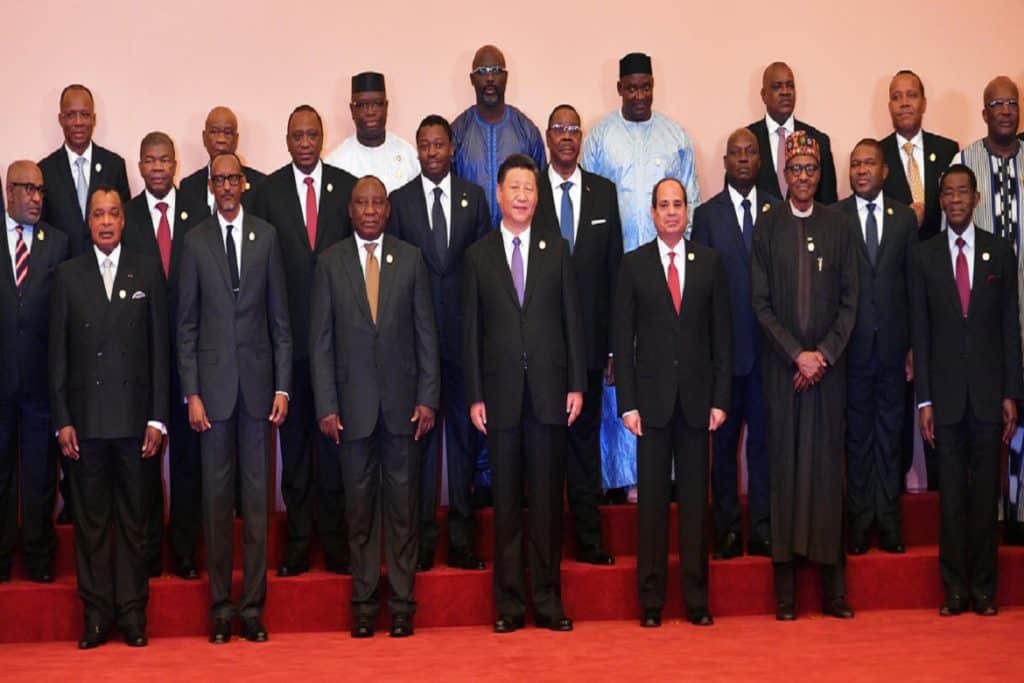Forum on China-Africa Cooperation is an official forum between People’s Republic of China and all the states of Africa except Swaziland as it does not have any diplomatic ties with China. There have been six ministerial meetings. The first ministerial meeting was held in 2000 in Beijing, China.
The forum is based on the objective of south-south cooperation and equality. It is also meant to enhance friendship, enhancing understanding and expanding consensus.
During the first ministerial meeting, follow-up mechanisms were set up to conduct regular evaluations on the projects implemented. This follow-up mechanism was set up in three levels:
a) the Ministerial Conference is held every three years;
b) the Senior Officials Follow-up Meeting and the Senior Officials Preparatory Meeting for the Ministerial Conference are held respectively in the year and a few days before the Ministerial Conference is held;
c) the consultations between the African Diplomatic Corps in China and the Secretariat of the Chinese Follow-up Committee are held at least twice a year.
In the first FOCAC summit, the former Chinese president Hu Jintao gave US$5 billion concessionary loan to Africa. In 2015, the value was estimated to be over US$100 billion. The Chinese government has been helping the African countries through FOCAC in almost every department of schooling, healthcare, military, investments and more.
For example, in Nigeria, construction of first urban rail system was possible in west Africa. A $500 million project that connects Abuja and Kaduna, a 180km distance. In a statement by the Senior Special Assistant on Media and publicity, Garba Shehu, the President said “For Nigeria, our partnership with China through the FOCAC platform, has resulted in the construction of the first urban rail system in West Africa. This $500 million project in Abuja was commissioned in July this year.” He also said that the railway today works efficiently with no issues- “indeed, a sign that Chinese technology is world class” he said.
Kenya has been a very important builder and beneficiary. Both Kenya and China have carried out more than 30 economic and trade cooperation on industrialisation, agriculture modernisation, infrastructure construction including Mombasa-Nairobi and Nairobi-Naivasha SGR. China-Africa Joint Research Centre has created 67,000 training opportunities and projects on poverty relief, public health, cultural exchanges and peace and security cooperation.
The Chinese government believes that the countries in the south has been too dependent on the West to lower value of themselves. The Chinese government aims to help countries move from the traditional donors and look for cooperation from South.
Scope of this year’s summit
This year, the most likely discussed topic will be the Belt and Road Initiative which was launched in 2013. The project is expected to increase the connectivity among the countries. It also links China to the eastern coast of Africa through the ‘Maritime Silk Road’.
The second most likely discussed topic will be African manufacturing and industrialisation. China has played a very important role in promoting African countries’ industrialisation. It has also set up manufacturing units in the country thereby increasing the employment opportunities.
Africa also hopes that China will transfer more production and create new industries. Zimbabwe for instance has to import all agricultural fertilizer for 40 years after independence. Within the Belt and Road initiative, it may soon be able to produce its own fertilizer needs.
2018 Beijing Summit
This year FOCAC summit was held in Beijing from 3-4th September with almost all the officials in attendance. The theme for this year was “China and Africa: Toward an Even Stronger Community with a Shared Future through Win-Win Cooperation.” In his inaugural speech, Chinese President Xi Jinping said that China will support the African countries in joining the Belt and Road Initiative as this will open the door for trading for the African countries.
Chinese President Xi Jinping also spoke about the “five-no” approach which means that it won’t be interfering with the internal matters of the African countries and give complete freedom to them to mark their own social, economic and political identity.
Though many showed concern about the debt-trap in which African countries could fall, the Chinese President in his inaugural speech said, “China will exempt certain African countries from outstanding debts incurred in the form of interest-free Chinese government loans due by the end of 2018”.
He also said that China will implement eight new initiatives with African countries in the next three year and beyond covering industrial promotion, infrastructure connectivity, trade facilitation, and green development. Xi Jinping also announced 60 billion USD of financing to Africa. He said, “The financing will be provided in the form of government assistance as well as investment and financing by financial institutions and companies.”
Conclusion
In 2013, US President Obama promised in Cape Town to “bring electric light to people in Africa where currently there is darkness”. But not a single light was lit up by Obama. Africa is finally realizing that its current governance models are not working.
The eradication of poverty in Africa is a global challenge. FOCAC has made the greatest contribution to the African struggle for progress. The price has been the accumulation of large new financial indebtedness, in 2018 exceeding 100 billion USD in debt.
FOCAC has been helping the African countries to come out of this condition and trying to eradicate poverty by providing financial help and also employment opportunities.
Image Credit: Flickr/GovernmentZa







